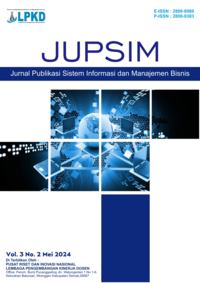Kuliner sebagai Ekspresi Gaya Hidup: Studi Preferensi Restoran Modern di Kalangan Generasi Z dan Milenial
DOI:
https://doi.org/10.55606/jupsim.v4i2.5039Kata Kunci:
Cuisine, Generation Z, Lifestyle, Social Identity, social mediaAbstrak
The development of the culinary industry in Indonesia shows significant changes, particularly among Generation Z and Millennials, who consume food not only for biological needs but also as a means of expressing their lifestyle and social identity. This study aims to explore the culinary preferences of young people toward modern restaurants in Semarang City and uncover the social and symbolic meanings behind their choices. A descriptive qualitative approach was employed using in-depth interviews, participatory observation, and digital documentation, involving 12 informants active on social media. The findings reveal that young people's culinary consumption is more oriented toward visual aesthetics, social recognition, and self-identity construction, closely aligned with lifestyle theory and social identity theory. Restaurant choices are influenced by atmosphere, interior design, and sustainability values, as well as the Instagram-worthy appeal of social media. These findings also confirm Pierre Bourdieu's concept of distinction, which states that culinary consumption serves as a symbol of status and the formation of social identity. This study offers insights for the culinary industry to design marketing strategies that align with the values and lifestyles of the younger generation.
Referensi
Bourdieu, P. (1984). Distinction: A social critique of the judgement of taste. Harvard University Press.
Damanik, J. (2020). Tren konsumsi makanan di kalangan generasi milenial: Implikasi terhadap industri kuliner. Penerbit Universitas Indonesia.
Kotler, P., & Keller, K. L. (2016). Marketing management (15th global ed.). Pearson.
Kusuma, R., & Yuliana, F. (2021). Pergeseran pola konsumsi dan peran restoran dalam pembentukan gaya hidup. Jurnal Ekonomi Kuliner, 12(3), 45–59. https://doi.org/10.1234/jekul.2021.12.3.45
Limilia, P., Gelgel, R. A., & Rahmiaji, L. R. (2022). Digital literacy among Z generation in Indonesia. https://doi.org/10.15405/epsbs.2022.01.02.1
Lin, B., Fu, X., & Lu, L. (2022). Foodstagramming as a self-presentational behavior: Perspectives of tourists and residents. International Journal of Contemporary Hospitality Management, 34(12), 4686–4707. https://doi.org/10.1108/IJCHM-01-2022-0042
Naegele, K. D., & Goffman, E. (1956). The presentation of self in everyday life. American Sociological Review, 21(5), 631. https://doi.org/10.2307/2089106
Nugraha, F., & Prasetyo, H. (2020). Citra diri dan restoran sebagai simbol status sosial dalam masyarakat urban. Jurnal Antropologi, 15(2), 112–125. https://doi.org/10.5678/jantropo.2020.15.2.112
Patton, M. Q. (2002). Qualitative research & evaluation methods: Integrating theory and practice. https://books.google.com/books?hl=en&lr=&id=ovAkBQAAQBAJ
Putri, M., & Nurhidayati, S. (2019). Makanan sebagai ekspresi diri: Analisis budaya konsumsi kuliner di Jakarta. Jurnal Budaya Indonesia, 8(4), 33–47.
Sandelowski, M. (1995). Sample size in qualitative research. Research in Nursing & Health, 18(2), 179–183. https://doi.org/10.1002/nur.4770180211
Strauss, W. (1991). Generations: The history of America’s future, 1584 to 2069. Harper Perennial.
Suprapto, D. (2019). Kuliner dan perubahan sosial: Fenomena restoran modern di Indonesia. Jurnal Sosial Budaya, 19(1), 78–89.
Suryani, P. (2022). Industri kuliner modern dan gaya hidup generasi Z di Indonesia. Pustaka Digital.
Tajfel, H., & Turner, J. (2023). An integrative theory of intergroup conflict. In Organizational identity (pp. 56–65). Oxford University Press. https://doi.org/10.1093/oso/9780199269464.003.0005
Widyantoro, A. (2021). Peran media sosial dalam membentuk identitas konsumen kuliner di era digital. Pustaka Cendekia.
Yeadon-Lee, A. (2018). Lead and disrupt – How to solve the innovator’s dilemma. Action Learning: Research and Practice, 15(1). https://doi.org/10.1080/14767333.2017.1414674
Unduhan
Diterbitkan
Cara Mengutip
Terbitan
Bagian
Lisensi
Hak Cipta (c) 2025 Jurnal Publikasi Sistem Informasi dan Manajemen Bisnis

Artikel ini berlisensiCreative Commons Attribution-ShareAlike 4.0 International License.







